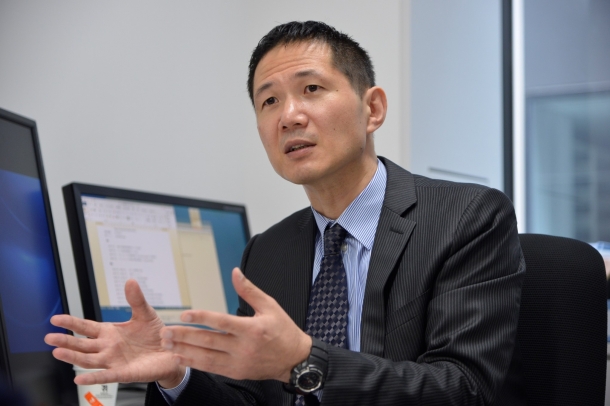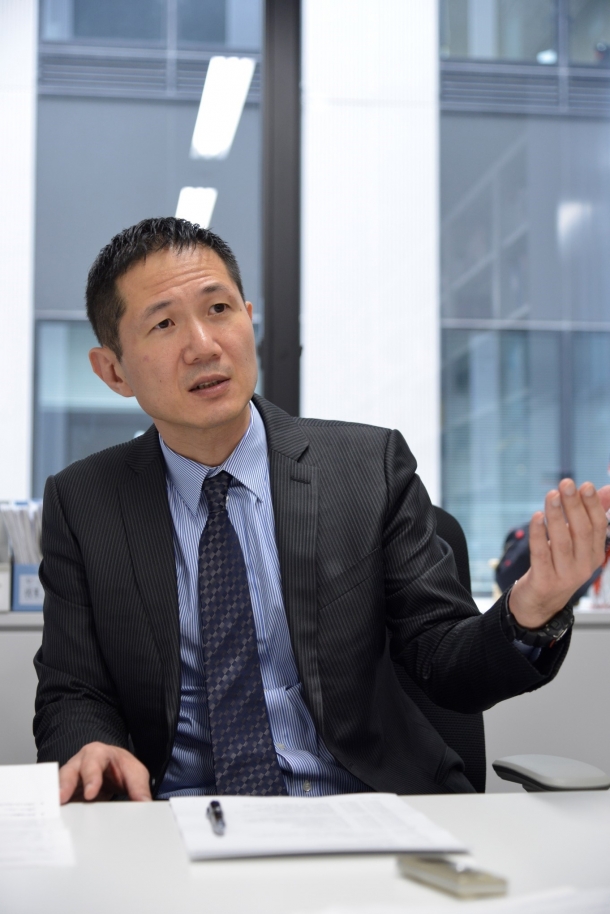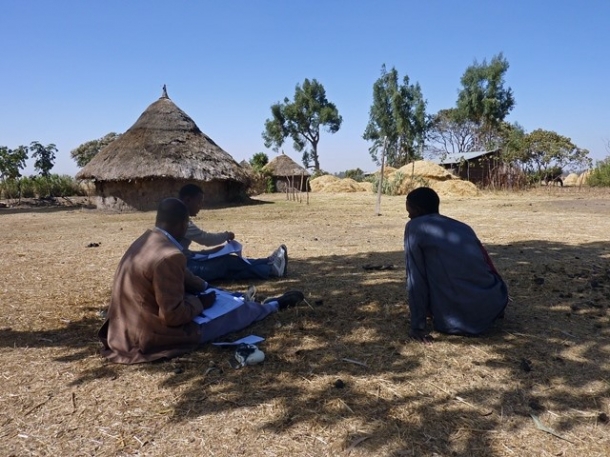Waseda Frontline Research Vol. 3, Part 1 – Japan will use its diverse relationships to rise again
Mon, Nov 2, 2015-
Tags
International economy and economic development researcher
Professor Yasuyuki Todo
Faculty of Political Science and Economics
Social and economic networks to promote innovation
Japan’s economy has been stagnant for over 20 years. Although stock prices are on the rise, the same cannot be said about income levels. Professor Yasuyuki Todo from the Faculty of Political Science and Economics is concerned about Japan’s future. He is afraid Japan may fall behind other developed nations if we do not act and has advocated for measures based on economic theory and experimental studies to stimulate economic growth. We met with Professor Todo to ask about what Japan must do to achieve economic growth based on his economic philosophy and recent case studies.
Correlation between networks and economics
I have been researching economic growth within the framework of international economy and economic development, focusing on experimental studies that examine how social and economic networks influence economic growth and development. “Social and economic networks” refers to interpersonal relationships as well as relationships between economic organizations (e.g. companies). Examples include personal relationships within and beyond regions and organizations as well as corporate supply chains.
I have conducted a variety of research studies in both Japan and developing countries such as China, Indonesia, Vietnam, Ethiopia, and Burkina Faso.

Figure: Impact of social and economic networks on economic growth and development (Source: Yasuyuki Todo)
In doing research on Japan, I conduct statistical empirical analysis using corporate data from Tokyo Shoko Research, which covers 4 million business relationships from among 800 thousand companies, as well as corporate data collected by the Research Institute of Economy, Trade and Industry. At the same time, I have made it my personal mission to visit companies in regions including the areas affected by the Great East Japan earthquake and to interpret the results of statistical analysis based on my field studies. I also analyze foreign countries using existing data. I often visit the sites myself and independently collect data.
Ties in quake-affected areas and non-affected areas
What became clear through these domestic and international experimental studies is that diverse networks contribute to advancing technologies and to facilitating corporate growth and economic development. In an example of my research on corporate supply chains in Japan, companies that have business relationships with “outsiders” (companies located not in the same prefecture) had higher performance. Since analyses of patent data has revealed that different prefectures have different technological fields, ties with other prefectures enables companies to absorb a variety of knowledge and grow.

Figure: Supply chain networks of companies in quake-affected areas (source: Yasuyuki Todo)
Meanwhile, strong ties within a region are also necessary. Research conducted on companies in affected areas after the Great East Japan earthquake revealed that companies that had more business contacts with non-affected areas resumed operations in a shorter period. On the other hand, companies outside of affected areas that had more business contacts in affected areas quickly recovered mid-term sales after the earthquake.
As you can see, we must build diverse networks with ties both within and outside a region in order to create an economy that is resilient to disasters.
Research in developing countries also demonstrates the need for diverse networks. Allow me to use my research to demonstrate how social networks affect the promotion of new agricultural technologies in rural Ethiopia. One observation made during my research was how simple agricultural techniques such as line planting (a technique of planting seeds in a row rather than dispersing them arbitrarily), spread quickly when people had ties with knowledgeable agricultural extension officers from outside the area.
However, the research also indicated that having close and strong ties, such as those between close friends, helped the use of organic fertilizer (which is more difficult to learn) spread more quickly. This is because promoting complicated techniques requires people to learn new techniques through close ties within a region. Examples such as these demonstrate the necessity of diverse ties for promoting various technologies.
As illustrated above, social and economic growth, and development require both strong ties within the region and organization as well as ties with outsiders. In other words, various networks contribute to society.
In the next issue, I will talk about the reciprocal relationship between political ties and economic activities.
Profile
1991: B. A., Asian Studies, University of Tokyo
1994: Graduated from Institute of Developing Economies Advanced School
1995: M.A., Food Research Institute, Stanford University
2000: Ph.D., Economics, Stanford University
2000: Assistant Professor, Department of Economics, Southern Illinois University
2001: Lecturer, Faculty of Economics, Tokyo Metropolitan University
2002: Assistant Professor, Faculty of Economics, Tokyo Metropolitan University
2005: Assistant Professor, School of International Politics, Economics and Business, Aoyama Gakuin University
2007: Associate Professor, Graduate School of Frontier Sciences, University of Tokyo
2010: Professor, Graduate School of Frontier Sciences, University of Tokyo
2012: Department Head, Graduate School of Frontier Sciences, University of Tokyo
2014-present: Professor, Graduate School of Economics, Faculty of Political Science and Economics, Waseda University
Currently serving as Faculty Fellow at the Research Institute of Economy, Trade and Industry, Visiting Fellow at the JICA Research Institute, member of the Governing Council of the Japan External Trade Organization, member of the Performance Evaluation Committee of The Overseas Human Resources and Industry Development Association, and member of the Trade Committee of the Industrial Structure Council at the Ministry of Economy, Trade and Industry.
Personal website http://www.f.waseda.jp/yastodo/index.html
Research
・Todo, Yasuyuki, Kentaro Nakajima, and Petr Matous, “How Do Supply Chain Networks Affect the Resilience of Firms to Natural Disasters? Evidence from the Great East Japan Earthquake,” Journal of Regional Science, 55(2), 209-229, 2015. DOI: 10.1111/jors.12119
http://www.cirje.e.u-tokyo.ac.jp/research/workshops/emf/paper2013/emf0527.pdf
http://onlinelibrary.wiley.com/doi/10.1111/jors.12119/full
・Todo, Yasuyuki and Hitoshi Sato, “Effects of Presidents’ Characteristics on Internationalization of Small and Medium Firms in Japan,” the Journal of Japanese and International Economices, 34, pp. 236-255, 2014.
http://www.sciencedirect.com/science/article/pii/S0889158314000483
・Matous, Petr, Yasuyuki Todo, Tatsuya Ishikawa, “Emergence of Multiplex Mobile Phone Communication Networks across Rural Areas: An Ethiopian Experiment,” Network Science, 2(2), 162-188, 2014.
http://dx.doi.org/10.1017/nws.2014.12
・Takahashi, Ryo and Yasuyuki Todo, “The Impact of a Shade Coffee Certification Program on Forest Conservation: A Case Study from a Wild Coffee Forest in Ethiopia,” Journal of Environmental Management, 130(30), 48-54, 2013.
http://www.sciencedirect.com/science/article/pii/S0301479713005483
・Todo, Yasuyuki, “Impacts of Aid-Funded Technical Assistance Programs: Firm-Level Evidence from the Indonesian Foundry Industry,” World Development, 39(3), pp. 351-362, 2011.
http://econpapers.repec.org/paper/etidpaper/08024.htm
http://www.sciencedirect.com/science/article/pii/S0305750X10001415
・Todo, Yasuyuki and Satoshi Shimizutani, “Overseas R&D Activities and Home Productivity Growth: Evidence from Japanese Firm-Level Data,” Journal of Industrial Economics, 56(4), pp. 752-777, 2008.
http://www.rieti.go.jp/jp/publications/dp/07e008.pdf
http://onlinelibrary.wiley.com/doi/10.1111/j.1467-6451.2008.00363.x/full
・Todo, Yasuyuki and Koji Miyamoto, “Knowledge Spillovers from Multinational Enterprises and the Role of R&D Activities: Evidence from Indonesia,” Economic Development and Cultural Change, 55(1), pp. 173-200, 2006.
http://papers.ssrn.com/sol3/papers.cfm?abstract_id=668508
http://www.jstor.org/stable/10.1086/505729
Writings
・開発経済学入門,新世社,2015
・日本経済の底力-臥龍が目覚めるとき-,中央公論新社,2011.
・途上国化する日本,日本経済新聞出版社,2010.
・技術伝播と経済成長-グローバル化時代の途上国経済分析-, 勁草書房, 2008.
Articles
・“Economic Networks for More Innovative and Resilient Economies,” June 26, 2015, Vox.
・“From Collusion to Competition? Japanese Business Groups in the 21st Century,” June 16, 2015, Vox.
・「サプライチェーンを通じた知識伝播-遠くのつながりと強いつながりの効果-」,経済産業研究所ウェブサイト,2015.
・「TPPの成長効果推計」,経済産業研究所ウェブサイト,2013.
・「TPP参加の意義 国際化、生産性向上の鍵に」,日本経済新聞「経済教室」,2011.
・「復興を超えた新たな高度成長へ」,経済産業研究所ウェブサイト,2011.
・「日本経済体質強化の方向 今こそ『内需より輸出』で」,日本経済新聞「経済教室」,2009.


















